(完整word版)初一下英语一般过去时
(完整word版)初一下一般过去时讲解及训练

初一过去时讲解及训练一般过去时1.一般过去时表示过去某个时间发生的动作或存在的状态,常和表示过去的时间状语连用。
一般过去时也表示过去经常或反复发生的动作。
常用过去时间:yesterday, this morning, just now, a moment ago, in May, last night / year / week, once upon a time, the other day, before …, when –clause, in the past连用。
如:What did you do yesterday? 昨天你干了什么?I met Lin Tao this morning. 今天上午我会到了林涛。
I was there a moment ago. 刚才我在那儿2.Be动词在一般过去时中的变化:⑴am 和is在一般过去时中变为was。
(was not=wasn't)⑵are在一般过去时中变为were。
(were not=weren't)⑶带有was或were的句子,其否定、疑问的变化和is, am, are一样,即否定句在was或were后加not,一般疑问句把was或were调到句首。
3.句中没有be动词的一般过去时的句子肯定句:Jim went home yesterday.把动词改为过去形式否定句:didn't +动词原形,如:Jim went home yesterday.Jim didn't go home yesterday.一般疑问句:在句首加did,句子中的动词过去式变回原形。
如:Jim went home yesterday.Did Jim go home yesterday?特殊疑问句:⑴疑问词+一般疑问句?如:Jim went home yesterday.Did Jim go home yesterday?What did Jim do yesterday?动词过去式变化规则:(1) 一般在动词后加-ed。
(完整word版)一般过去时及特殊疑问句

一般过去时一、一般过去时的简介:定义:表示过去某时发生的动作或存在的状态.结构:“主语+动词的过去式”用法:1。
表示过去某个时间发生的动作或存在的状态。
He was here yesterday.I got up at seven yesterday morning.My mother was at work yesterday afternoon.Did you have a good time last summer?2。
表示过去经常或反复发生的动作。
My mother often went to work by taxi last year.When I was a student, I often listened to music.3。
常与一般过去时态连用的时间有:at that time, then, at that moment, yesterday, yesterday morning (afternoon, evening…)last night (week, month, year…),一段时间+ago(several days ago), two days ago, a week ago, three years ago…in 1990,(in 1997…) ,just now, long before, long long ago二. 动词过去式构成规则1、一般在动词原形末尾加– edhelp → helped, look → looked, play → played, work → worked, listen → listened, wash →washed, clean → cleaned,2、结尾是 e 的动词加 -- dlive--—lived hope———hoped use-—-used like ——- liked3、末尾只有一个辅音字母的重读闭音节,先双写这个辅音字母,再加-ed。
(完整word版)初中英语语法一般过去时.

一般过去时口诀一般过去并不难,表示过去(动作、状态)记心间。
动词要用过去式,时间状语句末站。
否定句很简单,didn't动词(原形)前,其它部分不要变。
疑问句也好变,did放在句子前,其它部分依次站。
特殊疑问也简单,疑问句首记心间。
最后一条请注意,动词过去要牢记。
1.概念:过去某个时间里发生的动作或状态;过去习惯性、经常性的动作、行为;2.时间状语:ago, yesterday, the day before yesterday, last week,last(year, night, month, 具体时间, just now, at the age of , one day, long ago, once upon a time(很久以前),3.动词变化规则:规则变化:1 直接加ed eg:work worked worked2 以不发音的e结尾的,+d eg:live lived lived3 以辅音字母+y结尾的,变y为i加ed eg:study stuied stuied4 以重读闭音节结尾的,双写最后的辅音字母+ed eg: stop stopped stopped不规则变化例如相等 eg:cut cut read read<注:read和read读音不同!>sit sat have/has -- had, eat--ate ,see--saw4.否定形式:was/were+not;在行为动词前加didn't,同时还原行为动词。
5.一般疑问句:was或were放于句首;用助动词do的过去式did 提问,同时还原行为动词。
She often came to help us in those days. I didn't know you were so busy.6.一般过去式的构成形式:一般过去时表示句式:主语+过去动词+其他I had a word with Julia this morning.今天早晨,我跟朱丽亚说了几句话。
word完整版初中英语一般过去时

习与练去时讲解一般过定义表示的是:某个动作作发生在过去的时间里,并且这个动作已经完成了。
常和表示过去的时间状语连用。
等频率副词连用。
如:last year, yesterday等;也可表示过去经常反复发生的动作,常和口often, always一、巧记一般过去时:;were, have, has变had动词一般过去时,表示过去发生的事;be用was 或用,若是特殊得硬记。
谓语动词过去式,过去时间作标志;一般动词加-ed 否定句很简单,主语之后did n't添;不含be动词时疑问句也不难,did放在主语前;如果谓语之前有did,谓语动词需还原;动词若是was, were,否定就把not添。
含be动词时疑问句也不难,要把was,were放在主语前be的一般过去时:学习动词be的一般过去时,下面有一口诀,它可以帮你们更好地掌握动词be的一般过去时。
be的过去时有四巧:是时间状语巧,表示过去的短语要记牢;二是形式巧,单数was,复数were ;三巧是否定句结构, not 紧跟was/ were ;四是疑问句式巧,was/were向前跑(提前)【一巧】时间状语(即标志词)巧。
一般过去时表示过去发生的动作或存在的状态,恰巧与表示过去的一些时间状语连用。
1. yesterday 或以其构成的短语:yesterday morning(afternoon, evening) 等;2. 由"last+ —时间名词” 构成的短语:last ni ght, last year (wi nter, mon th, week) 等;3.由 "时间段+ago ” 构成的短语:a moment ago, a short time ago, an hour ago 等; 4. 其它:just now 等等。
过去时态的从句由某些表示 5.【二巧】形式巧。
它与一般现在时一样,形式多样:当主语是第一人称单数或第三人称单数时, 谓语。
英语中的十六种时态(可编辑修改word版)
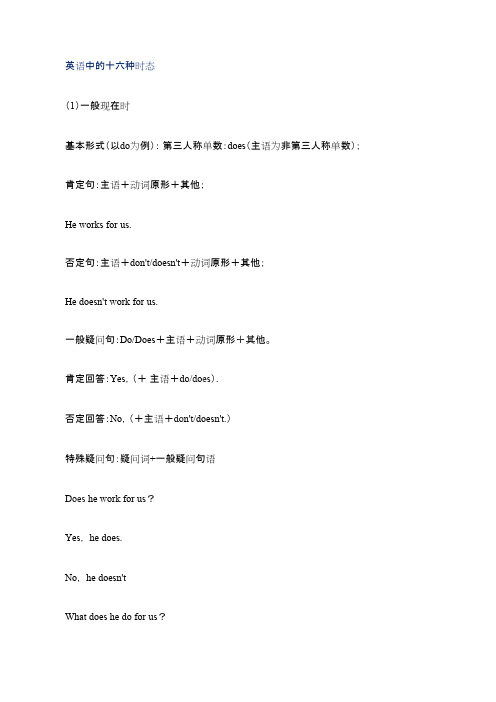
英语中的十六种时态(1)一般现在时基本形式(以do为例):第三人称单数:does(主语为非第三人称单数);肯定句:主语+动词原形+其他;He works for us.否定句:主语+don't/doesn't+动词原形+其他;He doesn't work for us.一般疑问句:Do/Does+主语+动词原形+其他。
肯定回答:Yes,(+主语+do/does).否定回答:No,(+主语+don't/doesn't.)特殊疑问句:疑问词+一般疑问句语Does he work for us?Yes, he does.No, he doesn'tWhat does he do for us?He works for us.(2)一般过去时be动词+行为动词的过去式否定句式:在行为动词前加didn't,同时还原行为动词,或was/were+not;was或were放于句首;用助动词do的过去式did提问,同时还原行为动词例如: Did he work for us?He didn't work for us.He worked for us.(3)一般将来时am/are/is+going to+do 或will/shall+doam/is/are/about to + doam/is/are to + do;一般将来时的表达方法be going to +动词原形be +不定式,be to+动词原形,be about to +动词原形be able to +不定式be about to+动词原形will + 动词原形;例如:He is going to work for us.He will work for us;He is coming.这是特殊的用一般现在时表达将来时态的例子!!(4)过去将来时be(was,were)going to+动词原形be(was,were)about to+动词原形be(was,were)to+动词原形肯定句:主语+be(was,were)going to+动词原形~.否定句:主语+be(was,were)not going to+动词原形~.疑问句:Be(Was,Were)+主语+going to+动词原形~?肯定句:主语+would(should)+动词原形~.否定句:主语+would(should)not+动词原形~.疑问句:Would(Should)+主语+动词原形~?He would work for us.(5)现在进行时主语+be+v.ing〔现在分词〕形式(其中v表示动词)表示现在正在进行的动作或最近在做的事。
(完整word版)一般过去时时表格

基本概念:一般过去时表示过去某个时间里发生的动作或状态;过去习惯性、经常性的动作、行为;过去主语所具备的能力和性格。
通常与yesterday, last month,last monday, two days ago等表示过去的时间状语连用。
肯定句:主语+was/were+其他否定句:主语+was/were+not +其他表状态疑问句:was/were+主语+其他+?肯定回答:yes, 主语+was/were, 否定回答:no, 主语+was/were+not注意:be (am,is, are)(am, is 的过去式为was, are的过去式为were )一般过去时基本构成肯定句:主语+动词过去式+其他否定句:主语+助动词(did)+not+动词原形+其他(注意,当改为否定句的时候,需要将动词还原)表动作疑问句:did+主语+动词原形+其他+?(注意,当改为疑问句的时候,需要将动词还原)肯定回答:yes, 主语+did,否定回答:no, 主语+didn’t注意:助动词主要为:do 和does的过去式为did.1、表示过去的动作,除用一般过去时,还可用used to do sth,来表示过去常常做某事,但现在不做了.如:he used to smoke a lot 他过去抽烟很凶特殊用法:2、用在特殊句式中,主要为it is (high /about) time that sb should do / did sthit is (high /about)time that we should begin / began our class3、would rather sb did sth 主语宁愿某人做某事,即用一般过去时表示过去现在或将来要做的事,如:I would rather you met her tomorrow过去式动词的变化规则eat-ate take-took run-ran sing-sang put-put make-made read-read write-wrote draw-drewdrink-drank fly-flew ride-rode speak-spoke sweep-swept swim-swam sit-sat。
完整word版一般过去时讲解
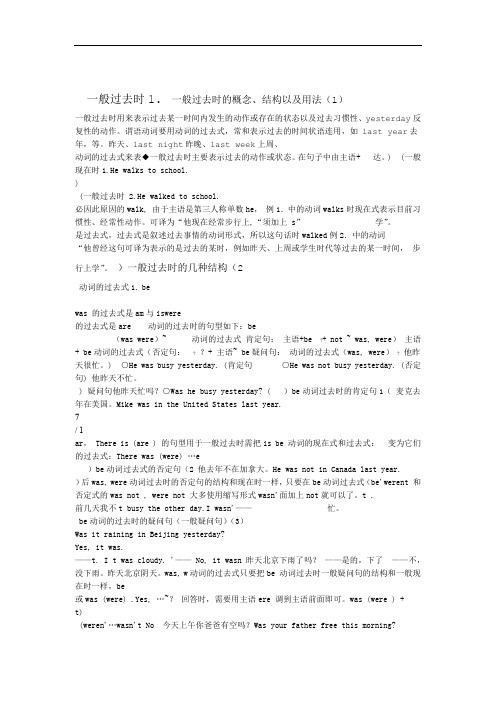
一般过去时1.一般过去时的概念、结构以及用法(1)一般过去时用来表示过去某一时间内发生的动作或存在的状态以及过去习惯性、yesterday反复性的动作。
谓语动词要用动词的过去式,常和表示过去的时间状语连用,如 last year去年,等。
昨天、last night昨晚、last week上周、动词的过去式来表◆一般过去时主要表示过去的动作或状态。
在句子中由主语+ 达。
) (一般现在时1.He walks to school.)(一般过去时 2.He walked to school.必因此原因的walk, 由于主语是第三人称单数he,例1.中的动词walks时现在式表示目前习惯性、经常性动作。
可译为“他现在经常步行上,“须加上 s”学”。
是过去式,过去式是叙述过去事情的动词形式,所以这句话时walked例2.中的动词“他曾经这句可译为表示的是过去的某时,例如昨天、上周或学生时代等过去的某一时间,步行上学”。
)一般过去时的几种结构(2动词的过去式1.bewas 的过去式是am与iswere的过去式是are 动词的过去时的句型如下:be(was were)~ 动词的过去式肯定句:主语+be ?+ not ~ was, were)主语+ be动词的过去式(否定句:??+ 主语~ be疑问句:动词的过去式(was, were)?他昨天很忙。
) ○He was busy yesterday. (肯定句○He was not busy yesterday. (否定句) 他昨天不忙。
) 疑问句他昨天忙吗?○Was he busy yesterday? ( )be动词过去时的肯定句1(麦克去年在美国。
Mike was in the United States last year.7/ 1ar, There is (are ) 的句型用于一般过去时需把is be 动词的现在式和过去式:变为它们的过去式:There was (were) …e)be动词过去式的否定句(2 他去年不在加拿大。
完整)初一下英语一般过去时
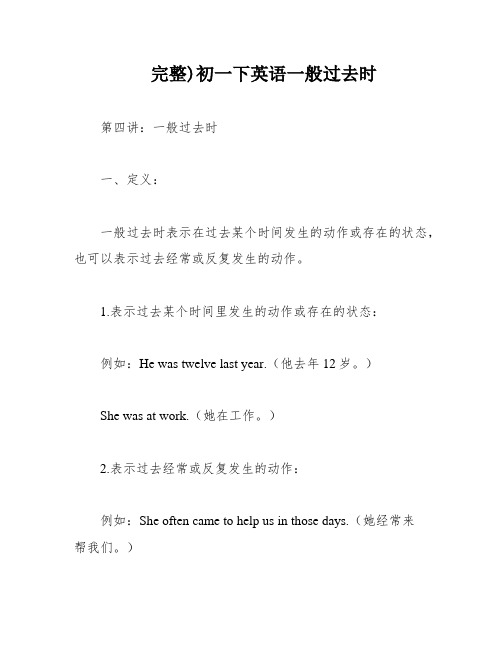
完整)初一下英语一般过去时第四讲:一般过去时一、定义:一般过去时表示在过去某个时间发生的动作或存在的状态,也可以表示过去经常或反复发生的动作。
1.表示过去某个时间里发生的动作或存在的状态:例如:He was twelve last year.(他去年12岁。
)She was at work.(她在工作。
)2.表示过去经常或反复发生的动作:例如:She often came to help us in those days.(她经常来帮我们。
)Mrs。
Peter always carried an umbrella.(彼得太太总是带着伞。
)二、常与一般过去时连用的词:1.时间状语ago(two hours ago(一段时间+ago)yesterday(morning。
afternoon。
evening)the day before yesterdaylast week。
last year。
last night。
last month…具体时间(如Jan。
fourth)just nowat the age of 10(过去时间段)one daylong agoonce upon a timethis morning(afternoon。
evening) long long ago(很久以前)the other day(前几天)at the moment三、一般过去时的构成1、系动词be的一般过去时构成:主语+be(was。
were)+其他主语是”I”时-----was主语为单数时-----was主语为复数及you时-----were否定句的构成:主语+be + not+其他was not = wasn’twere not = weren’t活学活用】填入适当的be动词。
1、Kitty was an English girl.(基蒂是一个英国女孩。
)2.Was it cold in your city yesterday?(昨天你们的城市冷吗?)3、I was not from Taizhou.(我不是来自台州。
(word完整版)初一下英语一般过去时

第四讲:一般过去时一、定义:表示过去某个时间里发生的动作或存在的状态,也表示过去经常或反复发生的动作。
1. 表示过去某个时间里发生的动作或存在的状态:e.g. He was twelve last year.She was at work.2. 表过去经常或反复发生的动作:e.g. She ofte n came to help us in those days.Mrs. Peter always carried an umbrella..二、常与一般过去时连用的词1. 时间状语ago( two hours ago (一段时间+ago) yesterday( morning,afternoon,evening) the day before yesterday last week,last(year,night,month …) 具体时间(如Jan .fourth)just nowat the age of 10(过去时间段)one daylong agoonce upon a time_ this morning(afternoon, evening) 了―long long ago (很久以前)the other day (前几天)at the mome nt三、一般过去时的构成、系动词be的一般过去时构成:主语+ be (was, were) + 其他主语是” I"时——was主语为单数时——was主语为复数及you时——were否定句的构成:主语+ be + not + 其他was not = was n't' were not = were n 't【活学活用】填入适当的be动词。
1. Kitty ____ an English girl.2. _______ (be) it cold in your city yesterday?3. I _____ not from Taizhou.4. It ______ (be) hot yesterday and most childre n _______ (be) outside.5. She ____ tall.6. How many people _______ (be) there in your class last term?7. There _______ (be) a football match on TV yesterday evening.8. I _________ (be) tired yesterday.9.1 _____ at school just now.10. __________ H e at the camp last week.11. __________ W e students two years ago.12. ___________ They on the farm a moment ago.13. _______________ Yang Ling eleven years old last year.14. ___________ There an apple on the plate yesterday.15. ___________ There some milk in the fridge on Sunday.2、情态动词的一般过去时构成:主语+ 情态动词+ 动词原形+其他She had to do her homework yesterday. 注意:情态动词后的动词一定要用原形,而且只能是情态动词的过去式。
(完整word版)一般过去时,一般将来时,一般现在时,过去进行时,现在进行时,现在完成时综合练习

一般过去时,一般将来时,一般现在时,过去进行时,现在进行时,现在完成时综合练习一.按要求填空.1. He has been to the amusement park for three times。
否定句:_____________________________________________________________________一般疑问句:_________________________________________________________________肯定、否定回答:_____________________________________________________________划线部分提问:_______________________________________________________________ 2. She was doing the dishes when Mr. Li came in。
否定句:_____________________________________________________________________一般疑问句:_________________________________________________________________肯定、否定回答:_____________________________________________________________划线部分提问:_______________________________________________________________ 3. Cao Yiqin went to the mountains last summer.否定句:_____________________________________________________________________一般疑问句:_________________________________________________________________肯定、否定回答:_____________________________________________________________划线部分提问:_______________________________________________________________ 4。
【英语】 一般过去时考点解析(Word版附答案)
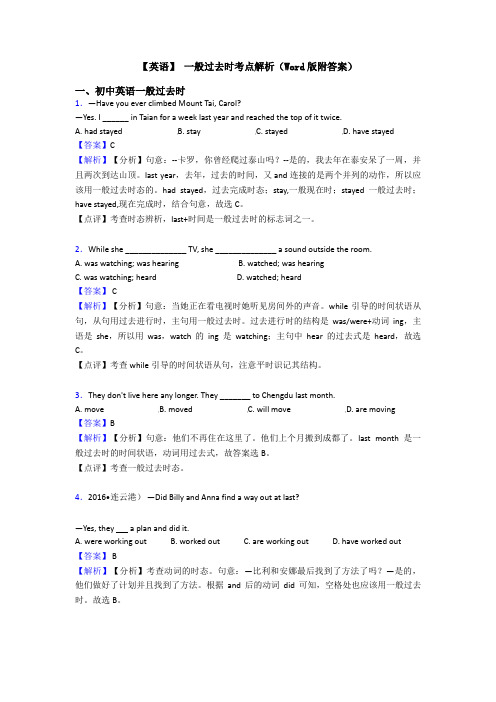
【英语】一般过去时考点解析(Word版附答案)一、初中英语一般过去时1.—Have you ever climbed Mount Tai, Carol?—Yes. I ______ in Taian for a week last year and reached the top of it twice.A. had stayedB. stayC. stayedD. have stayed【答案】C【解析】【分析】句意:--卡罗,你曾经爬过泰山吗?--是的,我去年在泰安呆了一周,并且两次到达山顶。
last year,去年,过去的时间,又and连接的是两个并列的动作,所以应该用一般过去时态的。
had stayed,过去完成时态;stay,一般现在时;stayed一般过去时;have stayed,现在完成时,结合句意,故选C。
【点评】考查时态辨析,last+时间是一般过去时的标志词之一。
2.While she ______________ TV, she ______________ a sound outside the room.A. was watching; was hearingB. watched; was hearingC. was watching; heardD. watched; heard【答案】 C【解析】【分析】句意:当她正在看电视时她听见房间外的声音。
while引导的时间状语从句,从句用过去进行时,主句用一般过去时。
过去进行时的结构是was/were+动词ing,主语是she,所以用was,watch的ing是watching;主句中hear的过去式是heard,故选C。
【点评】考查while引导的时间状语从句,注意平时识记其结构。
3.They don't live here any longer. They _______ to Chengdu last month.A. moveB. movedC. will moveD. are moving【答案】B【解析】【分析】句意:他们不再住在这里了。
(完整版word)初一年级英语英语一般过去时知识点含答案解析

(完整版word)初一年级英语英语一般过去时知识点含答案解析一、初中英语一般过去时1.—Are you a basketball player in you school?—Yes, I ______the team 3 years ago. I ______in it for 3 years.A. joined, wasB. was joined, amC. have joined, have beenD. joined, have been【答案】D【解析】【分析】句意:——你是你们学校的篮球运动员吗?——是的,我在3年前加入了篮球队。
我已经参加它3年了。
第一空,根据时间状语3 years ago,三年前,可知此处用一般过去时,故为joined。
第二空,根据for 3 years,可知此处用延续性动词的现在完成时,结构为have done,主语是I,故用have been。
故选D。
【点评】考查一般过去时和现在完成时。
注意根据时间状语确定动词的时态。
2.Bella, a young singer, ______ on January, 2015 because of cancer. Her death made us very sad.A. has been deadB. has diedC. was deadD. died【答案】 D【解析】【分析】句意:贝拉,一位年轻的歌手在2015年的1月因为癌症去世了。
她的死叫我们很难过。
根据时间on January, 2015可知用过去式,结合句意和语境应选D。
3.Jake _____his key in the office so he had to wait until his wife _______ home.A. has forgotten … comesB. forgot… comeC. had left… cameD. had left…would come【答案】 C【解析】【分析】句意:杰克把他的钥匙丢在办公室了,因此他不得不等到他的妻子回家。
(完整word)一般过去时练习

时态训练一般过去时(一)I。
一般过去时:表示过去某个时间里发生的动作或状态;过去习惯性、经常性的动作、行为;过去主语所具备的能力和性格。
基本结构:主语+动词过去式+其他 I was at school yesterday 。
I went to America last year 。
否定形式①was/were+not;②在行为动词前加didn’t,同时还原行为动词I wasn’t at school yesterday 。
I didn’t go to America last year ?一般疑问句:Was/ Were +主语+其他?Were you at school yesterday ?Did+主语+动词原形+其他?Did you go to America last year ?时间状语: then那时 yesterday 昨天 at that time在那个时候last night昨天晚上 last week上周 last month上个月 last year去年(last…上一个…)ago 之前 three days ago三天前 many years ago许多年前规则动词变过去式:1、一般直接+ed:walk---walked play--—played start—--started2、以不发音的e结尾的只+d:live———lived hope--—hoped use-——used3、以“辅音字母+y”结尾的动词,先变“y”为“i”再+ed:study--—studied carry———carried4。
以元音字母+y结尾的,直接加ed:enjoy—-—— enjoyed play——--played4、末尾只有一个辅音字母的重读闭音节词,双写末尾的辅音字母再+ed:drop—-—dropped skip---skipped stop——-stopped4.不规则变化:have/has —-had eat—ate see—saw am/is—was are—were go—wentdo—did take-took run—ran sleep—slept get—got meet-metbring—brought buy—bought think—thought can—could write—wrote read—read tell—told say—said give—gave feel—felt fall—fell teach—taughtmake—made send—sent lose—lost swim—swam drink—drankring-rang win—won put—put cut-cut let—let时态训练一般过去时(二)I.写出下列动词的过去式:get --—-_________ come ———-_________ watch -———_________ have ———-_________am/is --——_________ are ————_________ live—--—_________ talk-—-—_________cook -——-_________ work-——-_________ can -———_________ like—--—_________read-——-_________ write —-——_________ dance-—-—_________ give——--_________teach-—-—_________ study—-——_________ eat ———-_________ drink--——_________bring———-_________ help-——-_________ want —---_________ use—---_________stay ————_________ visit--—-_________ ride--—-_________ take -——-_________climb ----_________ wear---—_________ laugh ——--_________ go--—-_________sleep--—-_________ put--—-_________ borrow ———-_________ wait———-_________send-———_________ tell-——-_________ carry -—--_________ drop——-—_________make —--—_________ finish————_________ run —-——_________ meet--—-_________walk————_________ see-—-—_________ wash —-——_________ bump ——--_________play——--_________ skip-——-_________ ring ——--_________ carry —-—-_________win —--—_________ lose----_________ listen--—-_________ fall -—-—_________photo —--—_________ rain ——-—_________ jump—-——_________ happen----________hope ——-—_________ look ———-_________ stop ——-—_________ swim ——-—_________一般过去时(三)单项选择()1。
(完整word版)初中英语八大时态表
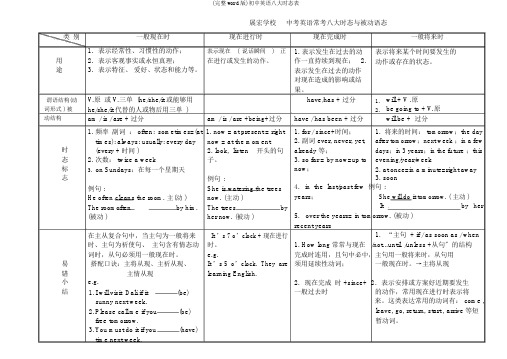
展宏学校中考英语常考八大时态与被动语态类别一般现在时现在进行时现在完成时一般将来时用途谓语结构(动词形式 ) 被动结构时态标志1.表示经常性、习惯性的动作;表示现在(说话瞬间)正2.表示客观事实或永恒真理;在进行或发生的动作。
3.表示特征、爱好、状态和能力等。
V.原或 V.三单 (he/she/it 或能够用he/she/it 代替的人或物后用三单 )am / is / are + 过分am / is / are +being+过分1. 频率副词: often;sometimes=(at 1. now = at present = righttimes); always; usually; every day now = at the moment(every + 时间 ) 2. look, listen开头的句2. 次数: twice a week子。
3. on Sundays:在每一个星期天例句 :例句 :She is watering the treesHe often cleans the room. 主(动 )now. (主动 )The roomoften by him.The trees by(被动 )her now. (被动 )1. 表示发生在过去的动表示将来某个时间要发生的作一直持续到现在; 2.动作或存在的状态。
表示发生在过去的动作对现在造成的影响或结果。
have/has + 过分 1.will + V .原2.be going to + V.原have / has been + 过分will be + 过分1. for / since+时间; 1.将来的时间: tomorrow;the day2. 副词 ever, never, yet,after tomorrow;next week ;in a fewalready 等;days;in 3 years;in the future ;this3. so far = by now=up to evening/year/weeknow; 2. at once=in a minute=right away3.soon4.in the last/past few 例句 :years;She will do it tomorrow. ( 主动 )It by her5.over the years= in tomorrow. (被动 )recent years在主从复合句中,当主句为一般将来It ’s 7 o’clock + 现在进行时、主句为祈使句、主句含有情态动时。
初一下册一般过去时

—Simple Past Tense♦叙述过去的事情,尤其是讲故事的时候,就必须用一般过去时的谓语来表示了. 如: My father worked in that factory for 30 years. 我爸爸在那间工厂工作了30年.♦动词过去式的变化形式3.一般动词的过去式规则动词的一般过去式的构成是在动词后面加ed.变化规律如下表:♦一般过去时的各种形式1.否定式行为动词一般过去时的否定形式要加助动词来构成,不过不是加do/does,而是加它们的过去式did, 构成didn’t (did not). 如:1.She didn’t like the food in the bowl. 她不喜欢碗里的食物.2.They didn’t notice the girl at first. 他们起初没有注意到哪个女孩.3.Baby bear didn’t look in the bedroom. 熊宝宝没有往卧室里看.*注: 助动词didn’t没有人称和数的变化.否定句中加了didn’t以后,原来的谓语动词要变成原形.比较下面句子:I walked to school today. 我今天走路去上学.I didn’t walk to school yesterday. 我昨天没有走路去上学.2.一般疑问式行为动词一般过去时的疑问式在句首加did构成.加了did以后,所构成的疑问句中谓语动词要变成动词原形.试比较:I telephoned my parents yesterday. 我昨天给父母打电话了.--Did you telephone your parents yesterday? 你昨天有给父母打电话吗?--Yes, I did. 是的,打了. / No, I didn’t. 不,没打.3.特殊疑问式行为动词一般过去时的特殊疑问形式与一般现在时的特殊疑问形式没有什么差别,只是使用的助动词不同而已. 如:--When did he die? 他什么时候去世的?--He died in 1919. 他是1919年去世的.--Why didn’t they want to go? 他们为什么不想去?--Because they were busy. 因为他们很忙.--How long did the space flight last? 航天飞行持续了多久?--It lasted 21 hours. 持续了21个小时.4.不规则动词的一般过去时不规则动词一般过去时的肯定,否定,一般疑问以及特殊疑问句都跟规则动词的相同.下面的不规则动词及其过去式要特别记忆.be—was/were have—had swim—swam buy—bought leave—left spend—spent come—came meet—met take—took do—didread—read write—wrote get—got send—sent go—went see—saw友情提示:范文可能无法思考和涵盖全面,供参考!最好找专业人士起草或审核后使用,感谢您的下载!。
(完整word版)初中英语语法八大时态总结

初中英语语法八大时态1.结构肯定句式: 主语+动词原形/动词的第三人称单数+其他否定句式: 主语+(助动词)don't/doesn't +动词原形+其他一般疑问句式: Do/Does+主语+动词原形+其他简略回答: (肯)Yes,主语+do/does (否)No,主语+do/does not缩写形式: don't = do not doesn't = does not例句:He often goes swimming in summer.I usually leave home for school at 7 every morning.2.用法1)表示经常的、习惯性的动作或存在的状态,常与表示频度的副词连用。
常用的频度副词有:always、often、usually、seldom、never、sometimes, every week (day, year, month…), once a week, on Sundays.频度副词在句中通常放在行为动词之前,系动词、助动词之后。
例如: He often goes swimming in summer.I usually leave home for school at 7 every morning.2)表示主语具备的性格、特征和能力等。
例如:All my family love football .My sister is always ready to help others .Ann writes good English but does not speak well.3)表示客观真理、客观存在、自然现象。
例如:The earth moves around the sun.Shanghai lies in the east of China.4)表示按计划或安排好的,或将要发生的动作,可用一般现在时表将来。
初一下英语一般过去时
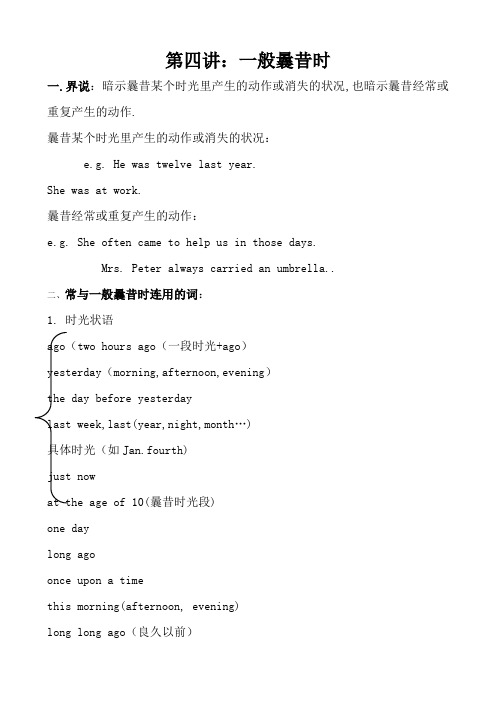
第四讲:一般曩昔时一.界说:暗示曩昔某个时光里产生的动作或消失的状况,也暗示曩昔经常或重复产生的动作.曩昔某个时光里产生的动作或消失的状况:e.g. He was twelve last year.She was at work.曩昔经常或重复产生的动作:e.g. She often came to help us in those days.Mrs. Peter always carried an umbrella..二、常与一般曩昔时连用的词:1. 时光状语ago(two hours ago(一段时光+ago)yesterday(morning,afternoon,evening)the day before yesterdaylast week,last(year,night,month…)具体时光(如Jan.fourth)just nowat the age of 10(曩昔时光段)one daylong agoonce upon a timethis morning(afternoon, evening)long long ago(良久以前)the other day(前几天)at the moment三、一般曩昔时的组成1、系动词be的一般曩昔时组成:主语 + be(was, were) + 其他主语是”I”时 ----- was主语为单数时 ----- was主语为复数及you时 ----- were否认句的组成: 主语 + be + not + 其他was not =was n’twere not=were n’t【活学活用】填入恰当的be动词.1、Kitty_____an English girl.2._________ (be) it cold in your city yesterday?3.I_____not from Taizhou.4.It ________ (be) hot yesterday and most children _______ (be) outside.5.She_____tall.6.How many people ________ (be) there in your class last term?7. There ________ (be) a football match on TV yesterday evening.8. I__________(be) tired yesterday.9.I _______ at school just now.10.He ________ at the camp last week.11.We ________ students two years ago.12.They ________ on the farm a moment ago.13.Yang Ling ________ eleven years old last year.14.There ________ an apple on the plate yesterday.15.There ________ some milk in the fridge on Sunday.2、情态动词的一般曩昔时组成:主语 + 情态动词 + 动词本相+其他She had todo her homework yesterday.留意:情态动词后的动词必定要用本相,并且只能是情态动词的曩昔式. They should(应当) be right.否认句的组成:主语 + 情态动词 + not + 动词本相 + 其他could not =couldn’tmust not =mustn’twould not =wouldn’tshould not =shouldn’tmight not = might nothad not to = hadn’t to【活学活用】填入恰当的词.1. She________(could not) speak English last year.2. You________(must not) open the door last night.3. They________(should not) be right at that moment.4. She said she________(would not) go to Japan.3、行动动词的一般如今时组成:主语 + 行动动词 + 其他These boys liked playing football.The girl read English every morning in 1998.加ed办法:1.直接加ed:work—— worked look——looked2.以不发音e结尾的单词,直接加d:live ——lived hope——hoped use ——used3. 以子音字母+y结尾的,变y为i加ed:study—— studied carry——carried worry——worried26个字母中除A E I O U五个元音字母外,其余21个都是子音字母4.以元音字母+y结尾的,直接加ed:enjoy ——enjoyed play——played5. 以重读闭音节结尾的,双写最后的子音字母+ed:stop—— stopped plan ——planned不规矩变更的动词曩昔式:have---had are---were get---got say---said feel---felt do/does---did is---was go---wentdrink--drank eat--ate bring----brought think----thought buy----bought catch---- caught teach ---- taught sit----sat wear----wore cut----cut sweep----swept sleep----slept become----became【活学活用】一.写出下例单词的曩昔式is\am_________ fly_______ plant________ are________ drink_________play_______ go________ make ________ does_________ dance________worry________ ask _____ taste_________ eat__________ draw________put ______ throw________ kick_________ pass_______ do ________二.完成句子1.Tom and Mary ___________ (come) to China last month.2.Mary __________ (read) English yesterday morning.3.I ___________ (call) Mike this morning.4.I listened but ___________ (hear) nothing.5.Tom ___________ (begin) to learn Chinese last year.st week we _________ (pick) many apples on the farm.7.What __________ (make) him cry (哭) just now?st year the teacher ___________ (tell) us that the earth moves around the sun.9.Eli ____________ to Japan last week. ( move)10. He ate some bread and _________ (drink) some milk.4. 否认句的组成: 主语 + 助动词(did)+not +行动动词本相 + 其他These boys didn’t(did not) like playing football.The girl didn’t (did not)read English every morning last year.留意:didn’t之后动词必定要用本相【活学活用】一.将下面句子改成否认句1.I had a word with Julia this morning.________________________________________________2.Li Ming studied English this morning.________________________________________________3.There was an apple on the table last night.________________________________________________4. I got up very early this morning.________________________________________________2、The police stopped me on my way home last night.________________________________________________6. They gave the concert last night.________________________________________________二.按照请求改写句子1. Mike _________________(not go) to bed until 12 o’clock last night. So she _______ (get ) up late.2. He __________ (not find )his key last night.3. Her mother __________ (not give) the girl any present one her birthday.4. Last week, I _________( not buy) a new bike, I _______(buy) a new kite instead.5. 一般疑问句含be动词或情态动词的一般疑问句Wereyoua student ?be动词主语其它Yes,Iwas.No,Iwasn’t.be + 主语 + 其它部分?确定答复:Yes,主语+be否认答复:No,主语+be+not留意:在答复时,主语要用响应的代词代替Couldyou speak English last year?情态动词主语动词本相其他部分Yes,I could.No,I couldn’t.情态动词 + 主语 + 动词本相 + 其它部分?确定答复:Yes,主语+情态动词否认答复:No,主语+情态动词+not留意:在答复时,主语要用响应的代词代替含be或情态动词一般疑问句的改写窍门:一调二改三问号一调:即把句中的be或情态动词调到主语前; 二改:更换主语称谓,即将句中的主语I my mine we our ours 等第一人称分离改为响应的第二人称 you your yours等; 三问号:句末的句号改为问号【活学活用】将下例句子改成一般疑问句1.I was an English teacher._________________________________________2. He was happy yesterday._________________________________________3. They were glad to see each other last year._________________________________________4. I should sweep the floor a moment ago._________________________________________行动动词一般疑问句的组成问句:Did your parents go to school yesterday?肯答:Yes,they did. 否答: No,they didn’t.确定答复用“Yes, 主语+ did.”否认答复用“No, 主语+didn’t(did not).”特别留意:对于行动动词的一般疑问句必定要留意动词的还原,因为时态与数的变更已经表如今助动词上了.含行动动词(或称为实义动词)一般疑问句的改写:窍门:一加二改三问号一加:即在句首加助动词did;二改:1.把谓语动词改为本相;2.更换主语称谓;三问号:句末的句号改为问号.【活学活用】按照请求改写句子2.We read English every morning last year. (改为一般疑问句)__________________________________________________2. Tom’s father listened to English onthe radio every evening . (改为一般疑问句)___________________________________________________3. Mr. Green cameto Shanghai a week ago.(改为一般疑问句,并做确定答复)___________________________________________________lie lived in a flat in Beijing last week. (改为一般疑问句, 并做否认答复)___________________________________________________5. Daniel enjoyed playing computer games.(改为一般疑问句,并做确定答复)___________________________________________________6.特别疑问句以疑问词开首,对句中某一成分提问的句子叫特别疑问句.经常应用的疑问词有:what who whose which when where how why等.特别疑问句有两种语序:(1).如疑问词作主语或主语的定语,即对主语或主语的定语提问,其语序是陈述句的语序:疑问词(+主语)+谓语动词+其他成分?如:who was singing in the room﹖whose bike was red﹖(2).如疑问词作其他成分,即对其他成分提问,其语序是:疑问词+一般疑问句语序?如:what class were you in﹖What did she look like﹖Where were you from﹖What time did he get up every morning﹖How did you know﹖特别疑问词+助动词+主语+动词本相+其他?eg:Where did you do study English?特别疑问词+be动词+主语+其eg:Why was your Mum so angry?特别疑问词+情态动词+主语+动词本相+其他?eg:What could I do for you?【活学活用】一.选择准确的单词填空(who, where, when)1._____ was that pretty girl? She was my sister.2._____ were Jack and Tom? They were behind you.3._____ did you go to school? I went to school from Monday to Friday.4._____ had a beautiful flower? John had a beautiful flower.5._____ were they? They were my parents.6._____ was my mother? She was in the living room.7._____ were you going? We were going to the bakery(面包坊).8._____ did Jim and Wendy play ball? They played ball in the afternoon.9._____ did he jog? He jogged in the park.10._____ were you last night? I was at home.二.就画线部分提问1.He wasmy father._________________________________________________2.They wereunder the tree._________________________________________________3.I often watched TV after dinner.(晚饭后) 提醒:饭后强调的是时光问题._________________________________________________4.Lily swamin the swimming pool.(泅水池)_________________________________________________5.Superman flied in the sky._________________________________________________6.I often brushed my teeth in the evening when I was young._________________________________________________7.Alan liked to play with Bill._________________________________________________8.Joe's father played badminton(羽毛球) every weekend last year. _________________________________________________9.The supermarket wasnear the school._________________________________________________10.The laptop(笔记本电脑) was on the table._________________________________________________11.Jennifer had a pair of earrings(耳饰)._________________________________________________12.The flowers werein the flower pot(花盆)._________________________________________________13.My grandpa often took us to the zoo ._________________________________________________14.I put the gold fish(金鱼) into thefish tank(鱼缸)._________________________________________________15.The monkey sleptlast night._________________________________________________课外功课:一.用所给动词的恰当情势填空.1.He put the books away and ________ (go) home.2. The boy is running and________ (tie) his shoes on the playground.3. My father________ (buy) a new computer for________ (I ) yesterday.4. He often ______ (go) to school by bike, but last year he often _________ (walk) to school.5. After she finished _______ (pack) everything,she ________(go) to bed.6. ---- Who______(wash) the plates on the table ?---- Jenny did.7. ---- When _______ you_____ (see ) the film “ Titanic”?8. It’s half past eleven now. Jim_____(have) lunch. Heusually______(have) it at this time.9. She ______(write) to Jill last month.She _________(write) to him next time.10. The students ________ (stop) talking when their teacher came up.11.There _____________ any hospitals (病院) in my hometown (故乡) in 1940. ( be not)12.There ____________ enough milk at home last week, wasn’t there?13.Eli ____________ to Japan lastweek. ( move)14. –When _______ you _________ (come) to China? - Last year. 15.Did she ________ (have) supper at home? 16.Jack____________ (not clean) the room just now. 17._________ (be) it cold in your city yesterday?18.How many people ________ (be) there in your class last term?19.It ________ (be) hot yesterday and most children _______ (be) outside.20. There ________ (be) a football match on TV yesterday evening, but I _________ (have) no time to watchit.212. ________ he __________ (finish) his homework last night?23. I__________(be) tired yesterday. 24. I___________(gain ) Arts degree last year.25. What _________ you___________ (do) last night?26. My grandfather _________ (leave) Hong Kong for New York in 1998.27. What _______ he ________ (do) yesterday?28. Last week I _______ (buy) a new bike.29012. ________ you ________ (finish) your homework yesterday?33. I ________ (eat) some eggs and bread this morning.34. Her mother __________ (not give) the girl any present.二.选择( ) 1. Lee ________ his mobile phone at home. A. was left B. has left C. had left D. left ( ) 2. _____ he ________ a good rest? No, he didn’t. A. Have, had B. Did, have C. Did,had D. Had, had ( ) 3. When _________ Lee________ school this morning? A. had, got to B. did, getto C. did, get D. did, got to ( ) 4. Will youplease say it again? I ________ quite _______ you. A.didn’t, hear B. haven’t,heard C. didn’t, heard D. hadn’t, heard( ) 5. ______ you ________ at six o’clock yesterday? A. Do ,get up B. Did, get up C. Do, got up D. Did, got up( ) 6.What did you see _________?A. now B. every day C. since 1990 D. just now( ) 7.He went into the room and _______ the door.A.lock B. locking C. locks D. locked( ) 8. —What _____ you _______ last week? —I bought a bag.A.did ,buy B. did , bought C. do, buy D. do,bought( ) 9. —_____ he ____ his lunch? — Yes, he did.A. Have ,had B. Had, has C. Did, have D. Did, had( )10.—Did the thieves _____ into the car?—No,they______.A. fell, didn’t B. fall, did C. jump, didn’t D. jump, did( ) 11. —When did May come back from HongKong? —She _____ from Hong Kong last Friday.A. come back B. comes back C. returned back D. came back( ) 12. ____ she _____ this dictionary in the bookshop nearby last week?A. Did, buy B. Does, buy C. Did,bought D. Does, buys( ) 13. He ____ to the station thismorning and was______ for the train.A. hurry, in time B. hurries, on time C. hurried, in time D. hurried, attime( ) 14. Where _____ Uncle Sun yesterday?A. was B.were C. did D. does( ) 15. —Have you seen him today? —Yes, I ____ him this morning.A. hasseen B. see C. will see D. saw( ) 16. He______ worried when he heard the news.A. is B. was C. does D. did( ) 17. There _____ a telephone call for my brother Steven yesterday?A. is B. are C. was D. were( ) 18. Liu Fengwei _____ three yuan for the lost library book.A.paid B. pay C. spent D. lost( ) 19. He ____ in this school in 1958.A. taught B. has taught C.teaches D. had taught( ) 20. They _____ tired so they stopped ____ a rest.A. are, have B. were, have C. were, to have D. are, having( ) 21. Yesterday I _____ in bed all day because I had a fever.A. lay B. lie C. laid D. lain( ) 22. Hello, Mike. It’s you. I _____ you ______ in Beijing. How long have you been here?A. don’t know,were B. hadn’t known, areC. haven’t known,are D. didn’t know, were( ) 23. It was raining hard when he ____ home.A. got B. get C. gets D. wasgetting( ) 24. He has taught in this school since he _____work.A. began to B. begins to C. begun to D. beginto( ) 25. She said her brother ____ in Beijing. He ______ to Japan on business last week.A. wasn’t, went B. hasn’t, went C. wasn’t, would go D. would be, went三.单句改错:下面每句均有一处错误,指出并加以纠正1. Did you found the answer to this question?_____________________________________________________2. Mary and her brother was born on the same day._____________________________________________________3. We start this lesson about ten minutes ago._____________________________________________________4. She hadn’t anything for breakfast this morning._____________________________________________________5. They came here for a year._____________________________________________________6. Amy singed a song for us at that party._____________________________________________________7.He said he will help me with my English when he was free._____________________________________________________8. The man saw the bag until it was late._____________________________________________________四.按照请求改写句子 1. The children had a good time in the park.否认句:__________________________________________一般疑问句:________________________________________对划线部分提问:____________________________________2. There were about nine hundred people at the concert.(音乐会)否认句:__________________________________________一般疑问句:________________________________________对划线部分提问:____________________________________3. There was only one problem.否认句:__________________________________________一般疑问句:________________________________________确定/否认答复:____________________________________4. Ann did her homework yesterday evening.否认句:__________________________________________一般疑问句:________________________________________对划线部分提问:____________________________________5. Last week I read an English book.否认句:__________________________________________一般疑问句:________________________________________确定/否认答复:____________________________________对划线部分提问:____________________________________五. 翻译下列句子1. 我过了一个劳碌但却刺激的周末._________ _________ __________ __________ __________ exciting weekend.2. Jenny爱好看书.昨晚她看了一当地理方面的书本.Jenny likes ______ _______. She _______ a book ______ ________ last night.3. Emma天天都演习弹吉他.可是昨天他没有演习.他为数学测验作预备了. Emma __________ the guitar every day. But he _________ ___________ yesterday. He _________ _________ the math test.4. 上周六他们做什么了?他们做功课和购物了.What ________ they _________ _________ Saturday?They _________ __________ homework and _________ ________ .5. 今天早上方方得做饭,因为他父亲不在家.This morning Fangfang _______ _______ _______ _______ because his father _______ ________ ________ yesterday.6. 你还有什么要说的?What _______ would you like _______ _______?7. 下学别忘了向先生说声再会.Don’t forget _______ ________ ________ ________ the teacher.8. 为什么你昨晚没有看电视?Why _______ you _______ TV last night?9. 他在打扫教室的时刻,发明地上有块表.When he ______ the classroom, he ______ a watch on the ground.10. 他什么时刻出生的?1980年.---When _______ he _______? ---_______ 1980.参考答案一.1.went 2. tying 3. bought;me 4. goes; walked 5. packing; went 6. washed 7. did; see 8. is having; has 9. wrote; will write 10. stopped 11. were not12.was13. moved14. did; come15. have16. didn’t clean17. was18. were19. was; were 20. was; had 21. drank22. did; finish23. was24. gained25. did; do26. left27. did; do28. bought29.was30. didn’t find 31.drank32. did;finish33. ate34. didn’t give二.1. D 2.B 3. B 4. A 5. B 6. D 7. D 8. A 9. C10. C11. D 12.A13. C14. A15. D16. B 17. C18. A19. A 20. C21. A22.D23. A24. A25.A三、略四、略五、1. I had a busy but2. reading books; read; about geography3. plays; didn’t practice; prepared for4. did; do last; did their; went shopping5. had to cook meals; wasn’t at home6. else; to say7. to say goodbye to8. didn’t watch9. was cleaning; found10. was born; in。
- 1、下载文档前请自行甄别文档内容的完整性,平台不提供额外的编辑、内容补充、找答案等附加服务。
- 2、"仅部分预览"的文档,不可在线预览部分如存在完整性等问题,可反馈申请退款(可完整预览的文档不适用该条件!)。
- 3、如文档侵犯您的权益,请联系客服反馈,我们会尽快为您处理(人工客服工作时间:9:00-18:30)。
第四讲:一般过去时一、定义:表示过去某个时间里发生的动作或存在的状态,也表示过去经常或反复发生的动作。
1.表示过去某个时间里发生的动作或存在的状态:e.g. He was twelve last year.She was at work.2.表过去经常或反复发生的动作:e.g. She often came to help us in those days.Mrs. Peter always carried an umbrella..二、常与一般过去时连用的词:1. 时间状语ago(two hours ago(一段时间+ago)yesterday(morning,afternoon,evening)the day before yesterdaylast week,last(year,night,month…)具体时间(如Jan.fourth)just nowat the age of 10(过去时间段)one daylong agoonce upon a timethis morning(afternoon, evening)long long ago(很久以前)the other day(前几天)at the moment三、一般过去时的构成1、系动词be的一般过去时构成:主语 + be(was, were) + 其他主语是”I”时 ----- was主语为单数时 ----- was主语为复数及you时 ----- were否定句的构成: 主语 + be + not + 其他was not = was n’twere not = were n’t【活学活用】填入适当的be动词。
1、Kitty_____an English girl.2._________ (be) it cold in your city yesterday?3、I_____not from Taizhou.4. It ________ (be) hot yesterday and most children _______ (be) outside.5、She_____tall.6. How many people ________ (be) there in your class last term?7. There ________ (be) a football match on TV yesterday evening.8. I__________(be) tired yesterday.9.I _______ at school just now.10.He ________ at the camp last week.11.We ________ students two years ago.12.They ________ on the farm a moment ago.13.Yang Ling ________ eleven years old last year.14.There ________ an apple on the plate yesterday.15.There ________ some milk in the fridge on Sunday.2、情态动词的一般过去时构成:主语+ 情态动词+ 动词原形+其他She had to do her homework yesterday.注意:情态动词后的动词一定要用原形,而且只能是情态动词的过去式。
They should(应该) be right.否定句的构成:主语 + 情态动词 + not + 动词原形 + 其他could not = couldn’tmust not = mustn’twould not = wouldn’tshould not = shouldn’tmight not = might nothad not to = hadn’t to【活学活用】填入适当的词。
1. She________(could not) speak English last year.2. You________(must not) open the door last night.3. They________(should not) be right at that moment.4. She said she________(would not) go to Japan.3、行为动词的一般现在时构成:主语+ 行为动词+ 其他These boys liked playing football.The girl read English every morning in 1998.加ed方法:1.直接加ed:work——worked look——looked2.以不发音e结尾的单词,直接加d:live ——lived hope——hoped use——used3. 以辅音字母+y结尾的,变y为i加ed:study——studied carry——carried worry——worried26个字母中除A E I O U五个元音字母外,其余21个都是辅音字母4.以元音字母+y结尾的,直接加ed:enjoy ——enjoyed play——played5. 以重读闭音节结尾的,双写最后的辅音字母+ed:stop——stopped plan——planned不规则变化的动词过去式:have---had are---were get---got say---said feel---felt do/does---did is---was go---wentdrink--drank eat--ate bring----brought think----thought buy----bought catch---- caught teach ---- taught sit----sat wear----wore cut----cut sweep----swept sleep----slept become----became【活学活用】一、写出下例单词的过去式is\am_________fly_______plant________are ________drink_________play_______go________make ________ does_________dance________worry________ask _____taste_________eat__________ draw________put ______throw________ kick_________pass_______do ________二、完成句子1.Tom and Mary ___________ (come) to China last month.2.Mary __________ (read) English yesterday morning.3.I ___________ (call) Mike this morning.4.I listened but ___________ (hear) nothing.5.Tom ___________ (begin) to learn Chinese last year.st week we _________ (pick) many apples on the farm.7.What __________ (make) him cry (哭) just now?st year the teacher ___________ (tell) us that the earth moves around the sun.9.Eli ____________ to Japan last week. ( move)10. He ate some bread and _________ (drink) some milk.4. 否定句的构成: 主语+ 助动词(did)+not +行为动词原形+ 其他These boys didn’t(did not)like playing football.The girl didn’t (did not)read English every morning last year.注意:didn’t之后动词一定要用原形【活学活用】一、将下面句子改成否定句1.I had a word with Julia this morning.________________________________________________2.Li Ming studied English this morning.________________________________________________3.There was an apple on the table last night.________________________________________________4. I got up very early this morning.________________________________________________5.The police stopped me on my way home last night.________________________________________________6. They gave the concert last night.________________________________________________二、按照要求改写句子1. Mike _________________(not go) to bed until 12 o’clock last night. So she _______ (get ) up late.2. He __________ (not find ) his key last night.3. Her mother __________ (not give) the girl any present one her birthday.4. Last week, I _________( not buy) a new bike, I _______(buy) a new kite instead.5. 一般疑问句含be动词或情态动词的一般疑问句Were you a student ?be动词主语其它Yes,I was. No,I wasn’t.be + 主语+ 其它部分?肯定回答:Yes,主语+be否定回答:No,主语+be+not注意:在回答时,主语要用相应的代词代替Could you speak English last year?情态动词主语动词原形其他部分Yes,I could. No,I couldn’t.情态动词+ 主语+ 动词原形+ 其它部分?肯定回答:Yes,主语+情态动词否定回答:No,主语+情态动词+not注意:在回答时,主语要用相应的代词代替含be或情态动词一般疑问句的改写秘诀:一调二改三问号一调:即把句中的be或情态动词调到主语前;二改:改换主语称谓,即将句中的主语I my mine we our ours等第一人称分别改为相应的第二人称you your yours等;三问号:句末的句号改为问号【活学活用】将下例句子改成一般疑问句1.I was an English teacher ._________________________________________2. He was happy yesterday._________________________________________3. They were glad to see each other last year._________________________________________4. I should sweep the floor a moment ago._________________________________________行为动词一般疑问句的构成问句:Did your parents go to school yesterday?肯答:Yes,they did.否答:No,they didn’t.肯定回答用“Yes, 主语+ did.”否定回答用“No, 主语+didn’t(did not).”特别注意:对于行为动词的一般疑问句一定要注意动词的还原,因为时态与数的变化已经体现在助动词上了。
